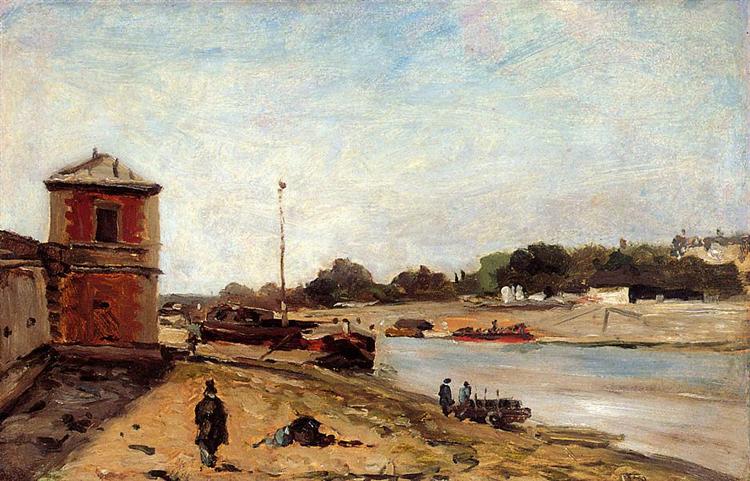Kuvaus
Paul Gauguin's The Seine in Front of the Quai de Passy, painted in 1875, stands as a vibrant testament to the 19th-century Impressionist style, a period when artists sought to capture the essence of light and color in the present moment. Depicting a landscape in the vicinity of Paris, this painting reveals Gauguin's mastery of creating evocative atmospheres and his interest in the interplay between environment and human experience.
The composition of the work is notable for its focus on the serenity of the landscape and the fluidity of the water of the Seine, which unfolds in an almost lyrical manner across the canvas. The river becomes a central element that not only divides the space in the work, but also acts as a mirror reflecting the sky, laden with soft clouds. The blue and green tones of the water, combined with the textures of movement, create a sense of depth and life. Gauguin uses a carefully chosen color palette that ranges from blues and grays to soft yellows and greens, elements that complement and contrast each other.
On the left side of the composition, several boats can be seen, adding a dimension of activity to the painting and suggesting the human presence in this natural landscape. These boats, although simple, are representative of everyday life in Paris, and their inclusion gives a sense of scale to the setting. The presence of people is seen in the upper right, where a small group, apparently calm, are arranged in a kind of contemplation facing the river. This choice to represent the human figure as an almost secondary element in relation to the landscape resonates with the impressionist ideas of capturing the moment, allowing the eye to focus on the relationship between man and nature.
Gauguin, though later to become a leading exponent of Post-Impressionism and a pioneer in the use of symbolism, still adheres to the principles of Impressionism in this work, highlighting his skill in the representation of natural light and colour. By softening the contours and using visible strokes, Gauguin evokes a sense of immediacy and freshness that almost allows the viewer to experience the same calm that surrounds the landscape. The light reflects how the secrets and nuances of the environment change over time, a central concept for the Impressionists.
"The Seine in Front of the Quay de Passy" not only encapsulates an ephemeral moment, but also reflects the relevant themes of life in modern 19th century Paris. Through this work, Gauguin not only presents a landscape, but also invites a deeper contemplation on the relationship of human beings with their environment, time and memory. This work, and Gauguin's later explorations in color and symbolism, would establish him as a crucial figure in the evolution of modern art, leaving a permanent mark on the path of art.
Reflecting on “The Seine in Front of the Quay De Passy,” the viewer is invited to immerse themselves in the serenity and subtle beauty of this captured moment, a reminder of the intrinsic connection between man, nature, and the passage of time. The work serves as a bridge between the captivating world of Impressionism and the development of modern art, an unwavering legacy that continues to resonate in the contemporary art landscape.
KUADROS ©, a famous painting on your wall.
Hand-made oil painting reproductions, with the quality of professional artists and the distinctive seal of KUADROS ©.
Painting reproduction service with satisfaction guarantee. If you are not completely satisfied with the replica of your painting, we will refund 100% of your money.

